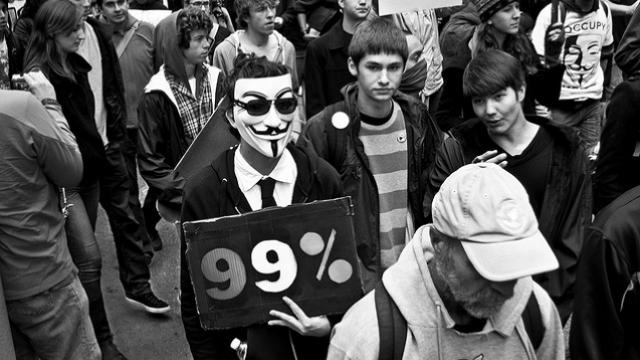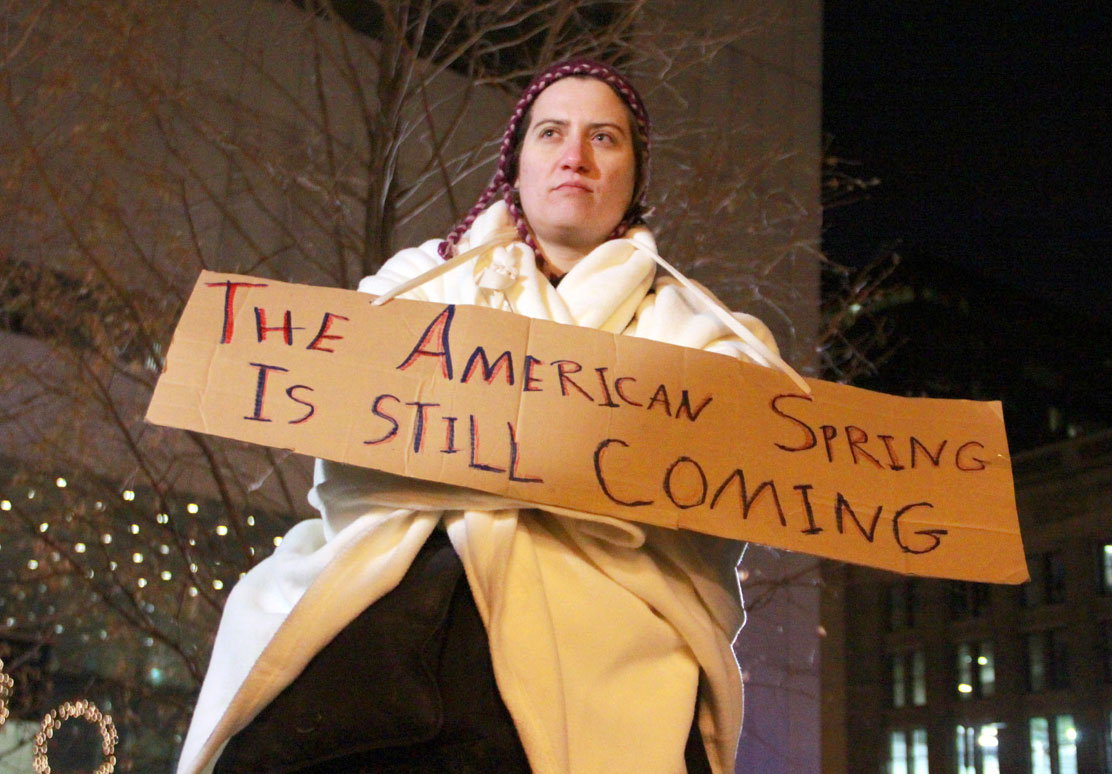
The Occupy movement has been the defining social movement of my generation, bringing the recent wave of globally networked uprisings for democracy and equality to the heart of capitalism and corporate control in the US. Through its audacious successes and frustrating shortcomings, Occupy fired a warning shot across the bows of Wall Street, signaling the beginning of a period of transformation of the United States that will rebuild democracy to turn us away from the path of economic and ecological destruction and build the new world that is not just an ideal but a necessity for our collective survival.
The Occupy movement created a center of gravity for the left that brought together a variety of political forces ranging from anarchists to progressives to libertarians. Despite the eviction in plazas around the country, a powerful network of individuals and organizations was activated. Many of them have continued to work together toward the goals born out of the Occupy movement, either in other movements or in spinoff projects like Occupy Homes, Strike Debt and Occupy Sandy.
Unions, community organizations and faith-based organizations played a significant role in supporting the movement as it grew from a scrappy upstart to a national behemoth. The contagious courage of the Occupy movement inspired unions and other groups to take a more militant stance and rethink their approach to organizing and their relationship to the Democratic Party as they continue to struggle with shrinking membership and unchecked attacks from the corporations seeking to eliminate any institutions that stand between them and unbridled profit.
The cross-movement relationships and experience forged by courageous high-risk acts of nonviolent civil disobedience by a new generation of leaders in the Occupy movement will be invaluable as new uprisings take off in the US and around the world. With things getting only better for the rich and worse for the poor, it's not a question of if - but when - the next historic shift in the tectonic plates of global capitalism will take place.
Challenges to Success
I contend there are three key factors to the Occupy movement's failure to produce a sustained revolutionary mass movement capable of solving the injustices it so effectively brought to light: coordinated state repression at a national level, a failure to effectively incorporate racial analysis and leadership by people of color who have been hit hardest by the economic crisis into Occupy, and the fundamentally undemocratic nature of the OWS general assembly model.
State Repression
The movement’s decline can most directly be attributed to the nationally coordinated crackdown by the Department of Homeland Security under the direction of the Obama administration as camps were cleared around the country. Once again, the Democratic Party exposed itself as a party that serves the interests of Wall Street and the financial elite over the increasingly impoverished people that elected them.
Official documents show the FBI was considering plans to assassinate leaders of the Occupy movement with suppressed sniper rifle fire, and extensive infiltration and spying was occurring in groups across the country. In some cases, infiltrators went so far as to instigate illegal activity so as to discredit the movement and bring severe charges against individuals who arguably would not have taken such actions without being prodded by agents of the state.
Race and the Occupy Movement
While the slogan "We are the 99%" provided a clear unifying message of class consciousness, many participants in the Occupy movement failed to recognize the historic role of white supremacy, patriarchy and colonialism in shaping the power dynamics that exist in the US context.
As a result of its rhetoric and inaccessible culture, the Occupy movement often failed to resonate with communities of color or address in concrete ways the immediate struggles of their communities: from police brutality to mass incarceration to immigration reform to access to affordable housing and quality education.
If we are to deconstruct capitalism, having leadership and a base that reflects the frontline communities most impacted by inequality is essential to expose the racist exploitation necessary to uphold such an unjust system and to tap into the underdeveloped political power of racial and ethnic groups that will outnumber whites in the US by 2050.
The General Assembly
The general assemblies, meant to be a utopian and egalitarian decision-making process free from the contradictions of hierarchy, were without a doubt, the most dysfunctional and frustrating function of the Occupy movement. Most utilized a 90 percent modified consensus process, where if less than 90 percent of the group approved of a decision it would be rejected. This cumbersome process led to daily meetings that often lasted four hours and struggled to make even the most benign of decisions. Thus, from the beginning, we were stuck with a fatally flawed process that undermined many of our goals.
This inefficient and confusing method of decision-making made the movement incredibly inaccessible to those who could not afford to spend four hours a day at the general assembly, especially low-income and working people, parents and communities of color, the very constituencies most affected by the issues raised by the Occupy movement.
A Leaderless Movement
The Occupy movement was born as a critique of the social order and raised fundamental questions of democracy, corruption and movement structure. As a result, at times it erred on the side of being reactionary, alienating potential participants. It claimed to be leaderless and often responded with hostility toward those who showed initiative.
A movement that hopes to take on the wealthiest and most powerful forces in the history of the world must be as uncompromising with its objectives as it is pragmatic with its tactics. The tendencies toward purism within the Occupy movement do not serve its goals of changing the balance of power between the haves and the have-nots.
Unfortunately, people who have felt powerless their entire lives often find it easier to tear down the people and organizations within arm’s reach than to work together against the seemingly infinite power of multinational corporations.
We were right to be skeptical of the Democratic Party and the danger of co-optation. A cautious approach to the systems that the financial elite have learned to control and wield to their ends should be a starting point for anyone seeking to fundamentally change them. We were right to recognize the dangers of the nonprofit industrial complex and the way that funding sources have been used to control social movements while limiting their demands and potential.
This does not mean, however, that we should never under any circumstances work with nonprofits or Democrats to advance our objectives. Nor does it mean we should reject all forms of leadership or organization that involve hierarchy or delegation of authority. In fact, every major social movement in US history had leadership and disciplined organizational structure that helped them identify and work toward their objectives.
The Way Forward
At its core, the Occupy movement was a struggle to restore democracy to a society dominated by corporate control. Wealth inequality and the domination of economic, political and social systems by the super rich are unavoidable results of capitalism.
True democracy is incompatible with capitalism. When communities are able to authentically make their voices heard and wield power to have their fundamental human needs met, a system that relies on one group profiting at the expense of another will be deconstructed. The kind of democracy that is necessary to transform our society requires more than simply electing a representative every four years - it enables all members of society to participate in meaningful decision-making that improves their quality of life.
By building and strengthening spaces where people can exercise direct democracy to exert control over their communities we can create a counterweight to corporate control and start to rebuild the social fabric with which we can build a movement to change the balance of power in the US.
One need look no further than to our neighbors in South America to see illuminating examples of what an evolution in democracy could look like in practice.
In Brazil, the Movimento dos Trabalhadores Rurais Sem Terra, or landless workers movement, has won land titles for 350,000 landless worker families by occupying vacant land across the country and using participatory democracy to run self-sustaining camps where farmers work the land to provide for their communities. There are currently 180,000 families occupying land to demand it be turned over and 1.5 million members across the country.
In Venezuela, consejos comunales or community councils bring together groups of 200-300 families in neighborhoods across the country to make decisions about their communities. If they decide to build a school, fix the roads, or start a business, the government grants the funds to complete the project as decided by the people who live there. These participatory spaces are funded to the tune of more than $1 billion per year, giving the poorest of the poor meaningful decision-making opportunities.
Democratic militant labor unions, neighborhood and community organizations and liberation theology based religious organizations have united in both countries to build an independent political force accountable to their movements that has taken power at all levels of government, including the presidency.
In doing so, Brazil and Venezuela have cut poverty in half, rewritten their constitutions to defend human rights and institutionalize participatory democracy and improved access to quality housing, education, jobs and social services.
While neither country is perfect or without contradictions, their democratic mass movements have begun and will continue to deepen a process of transforming their countries into truly democratic nations that defend their people instead of corporate interests.
Conclusion
Never have so few had so much while so many have so little. Never has our planet faced such grave threats to our collective survival. Yet we've never have had access to such advanced communications technology instantly uniting movements, from Egypt to the US, with real solutions to the problems resulting from global capitalism. We're not alone. Our movements can and must lead the way forward to a new world based on values that promote healthy and equitable communities, averting the converging economic and ecological crises.
We must unite the natural enemies of global capitalism while we grow and strengthen movement-oriented democratic institutions to engage these groups and invest in their leadership and political education. In doing so, we will prepare to maximize the next inevitable high tide of movement activity while sustaining long-term transformational organizing.
Maybe the Occupy movement was meant to exist only as a critique and not to become the vehicle that would answer the questions it raised, like a tremor warning of the impending seismic shift in the tectonic plates of global capitalism. It's up to each of us who believe in the hope of a generation born on plazas across the country to rebuild an authentic participatory democracy in our neighborhoods, our workplaces, our places of worship, our schools and our government. In doing so, we will deconstruct corporate control of society and build the movement necessary to fight for and win a new world controlled by our communities that is just, equitable and free. The fate of the planet quite literally depends on it.
3 WAYS TO SHOW YOUR SUPPORT
- Log in to post comments

















